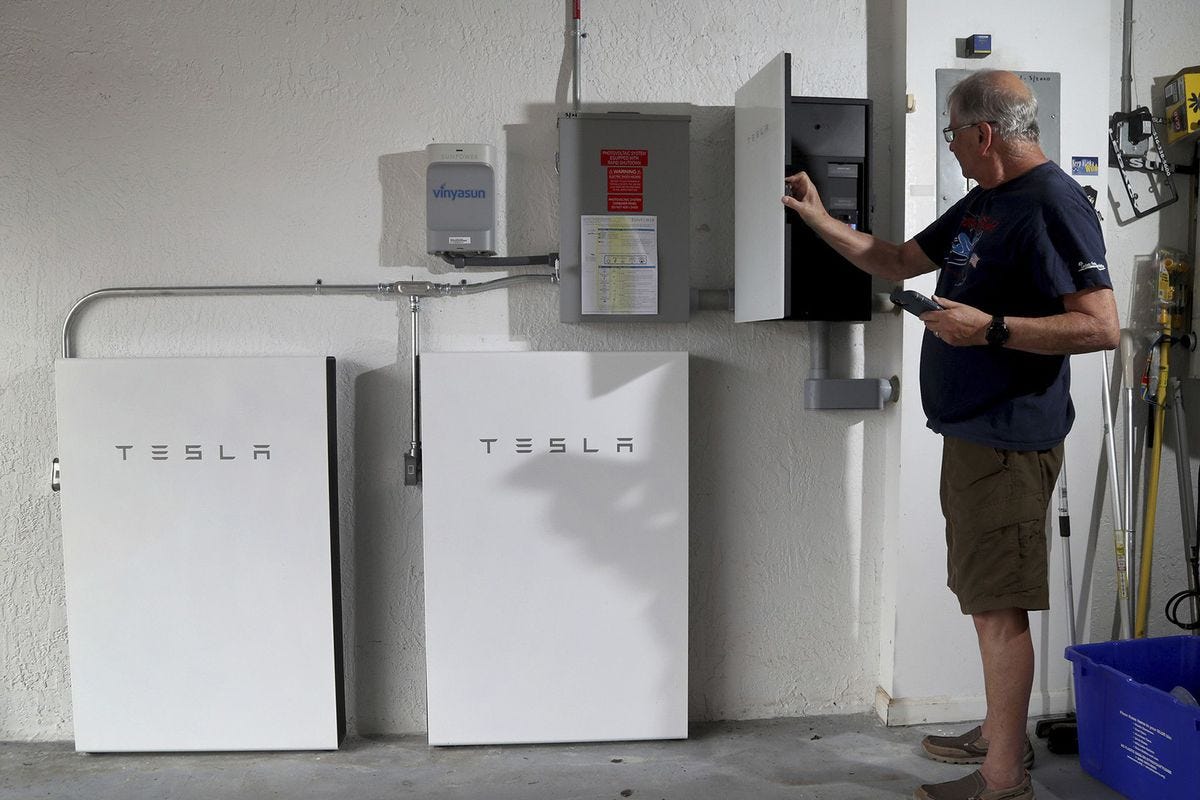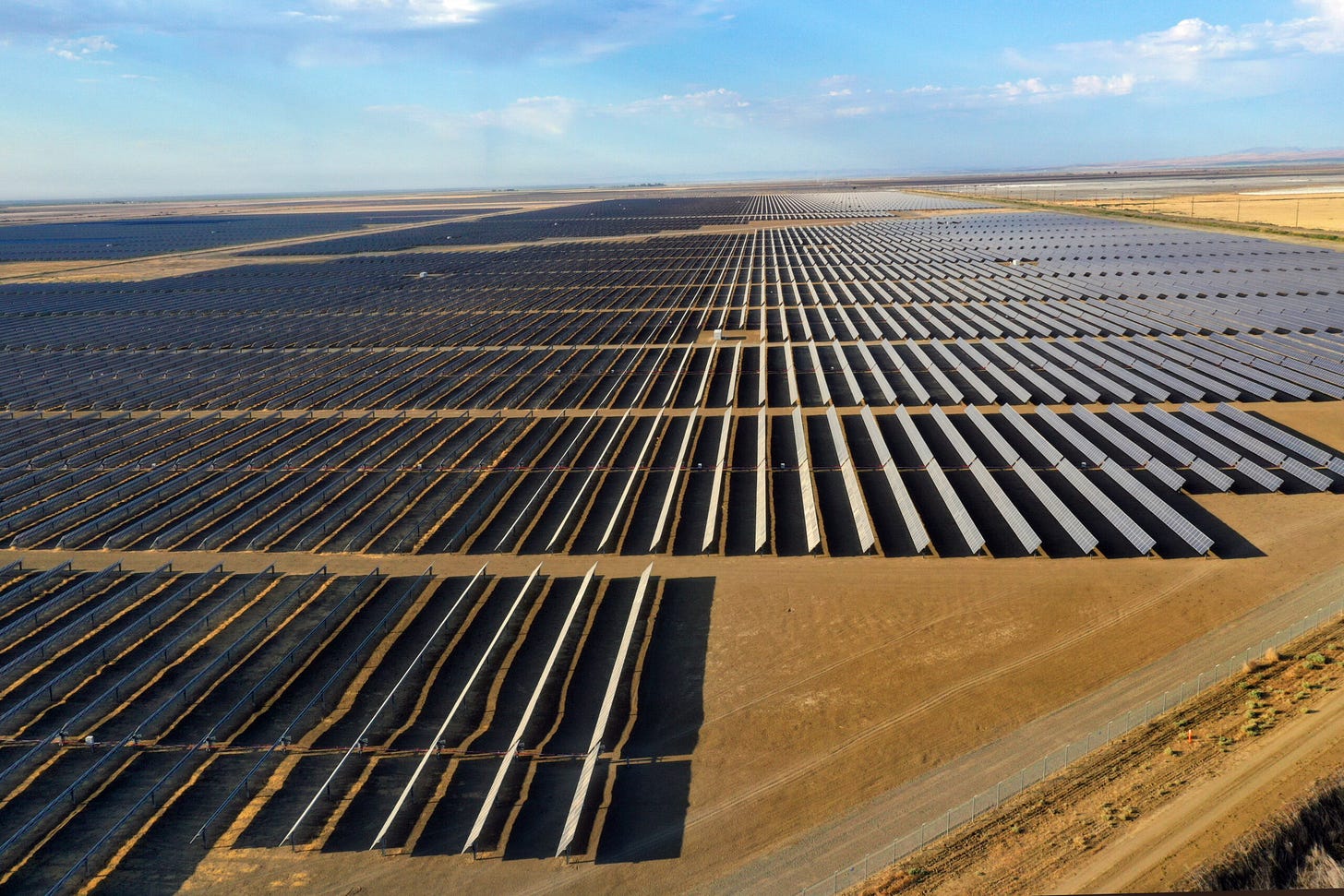👋 25 new Substackers
🎉 61 new Climate Investing Club members
📖 7 min read time
In last week's newsletter, we highlighted a set of organizations that help retail investors divest their 401(k)s from fossil fuels. Today, let’s talk about if/how you can divest your power bill from fossil fuels.
🛜 CIC Slack news: #AMAs galore
Another big thanks to Zach Stein of Carbon Collective for joining us for last week’s Ask Me Anything, which you can find here. We’ll be hosting another asynchronous #AMA next week but we’re not quite ready to announce it just yet!
Where: As always, our AMA’s are in the Climate Investing Club slack.
We have a favor to ask you!
We’ve been writing this newsletter since March, and we would LOVE a little feedback so we can improve and ensure that we’re headed in the right direction.
Have other feedback? Feel free to comment below or email us at connect@investwithintetion.io! We aim to please :)
You (might) have the power ⚡
The average US household spends about $1500 per year on electricity, which comes out to $200+ billion in total annual residential spending and 12% of all CO2 emissions (from US energy consumption).
These are big numbers!
Fortunately, households increasingly have the option to align their values with electricity purchasing, to signal their preferences for green energy to the market by choosing renewable energy.
So let’s go over your options as the proud owner of a monthly electric bill.
In some states, you have a fair amount of choice!
Historically, US states designated regulated utilities that were responsible for all links of the electricity supply chain: the generation, transmission and distribution of electricity to consumers.
However, after years of reform, 17 states & DC, residents can now choose to buy electricity from a variety of power companies.
There are a couple ways that these reforms manifest…
Buy renewable from your energy provider
If you live in a state with a restructured energy market, you may be familiar with marketplaces that look like Texas’s Power To Choose. If so, you’ll have your choice of dozens of energy providers and power purchase plans!
The marketplace will almost certainly let you filter for renewables. You can pick a company that only supplies renewable energy, or pick a partial renewable energy plan from other electricity providers.
Does this have impact / is it values aligned / does it provide a market signal?
Be careful here. Do your own research to better understand this decision. Some of these renewable options are more marketing than substance. They may charge a premium despite it already being plenty lucrative to generate solar/wind power. In such cases, your purchase will be values-aligned but may not spur additional renewable development because renewables may already be the most economical option on the market.
Community Choice Aggregation (CCA) makes the choice for you

If you’re lucky, one day you’ll receive a flyer in the mail explaining that you’re automatically enrolled in a CCA program.
This may be your reality if you live in California, Illinois, Maryland, Massachusetts, New Hampshire, New Jersey, New York, Ohio, Rhode Island or Virginia. These states passed laws allowing for Community Choice Aggregation.
CCA programs allow local governments to procure power on behalf of their residents, businesses, and municipal accounts from an alternative supplier while still receiving transmission and distribution service from their existing utility provider. CCAs are an attractive option for communities that want more local control over their electricity sources, more green power than is offered by the default utility, and/or lower electricity prices. By aggregating demand, communities gain leverage to negotiate better rates with competitive suppliers and choose greener power sources.
CCAs are local, so it's up to individual cities/counties to establish one. This means that despite living in a state that allows for CCAs, you may not live in a city that has one. For example, in VA/NH, no CCAs have been implemented yet. At the other end of the spectrum, most large California cities have CCAs.
Does this have impact / is it values aligned / does it provide a market signal?
If you live in a CCA district, consider yourself lucky. It’s likely that you’ll save money and the CCA will buy green energy on your behalf. This can be impactful because climate-focused CCAs often make long term purchase commitments that help support renewable construction! The only thing you need to do here is not opt out.
Buying renewable energy in a regulated market
Many of you live in states or localities with a monopoly regulated utility that distributes electricity to you. Don’t fret! Often, these utilities offer a green tariff that you can opt into. For example, utilities like Xcel Energy and Portland General have some of the top green power programs in terms of sales.
Does this have impact / is it values aligned / does it provide a market signal?
We’re huge fans of community solar and believe that participating in such a program can drive impact because such projects probably wouldn’t exist otherwise, and they encourage states to build more once they see increased demand.
The other options, called green power products, *could* be impactful, but it’s unclear. You may or may not have to pay a premium, but if that premium comes with Renewable Energy Certificates (RECs), you can feel safe that they won’t be double-counted by the states that have set renewables targets. However, some of these states have strange ideas of what constitutes renewable, like Virginia’s designation of biomass as renewable.
Install your own solar/battery/geothermal
Installing solar panels or geothermal is an option for anyone looking to invest in green power. There can be significant upfront costs here, but some companies offer decent financing options or revenue-share agreements. And of course, there are new IRA tax credits on top of whatever your state offers.
It’s a bit tricky to find a good solar contractor, so the best method is to ask your neighbors. Jump onto the internet to suss out bad reviews.
Does this have impact / is it values aligned / does it provide a market signal?
This can certainly be impactful, especially if paired with a battery purchase. These days, the battery is as impactful as the panels because the grid requires more power storage as it becomes distributed and dependent on intermittent renewables.
Invest in solar projects on the open market
If you’ve been following us, you’ll be familiar with names like Raise Green, Energea, Climatize, and other crowdfunding mechanisms. These companies provide funding for individual solar projects and allow you to participate in this funding as well!
Does this have impact / is it values aligned / does it provide a market signal?
This, of course, doesn’t actually buy you electricity, but if you’re stuck in a place that doesn’t have any renewable options, this is a way that you could supplement your power purchasing and feel relatively confident that you’re making an impact.
📈 New ways to invest in climate
What’s new since last week’s newsletter. Disclaimers: selection based on company description but impact not assessed. Not investing advice, DYOR.
Invicta Water ($5M, common stock): Aims to eliminate PFAS and other high health risk chemicals from water worldwide
Solar for Congregation Ahavas (8% annual interest, 5 year term): Solar for NJ theatre.
Solar for Shakespeare Theatre (8% annual interest, 5 year term): Solar for NJ church.
Unreal Deli ($20M, common stock): Makes award-winning, premium plant-based deli meats.
YouSolar ($39M valuation, common stock): Created the PowerBloc®, a solar nanogrid that delivers reliable and clean power to the home.









